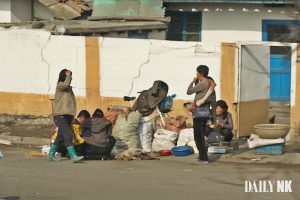It has been over a year since North Korean authorities locked down the border in order to prevent the spread of COVID-19. As all routes to North Korea have been blocked, North Koreans have begun worrying about how to survive. Due to the lockdown, they are unable to import items to sell in local markets. For many North Koreans, the means to make money has suddenly disappeared.
In fact, the lockdown has had a significant impact on the country’s markets. The consequences have been readily seen in the inflation of commodity prices. About two weeks after the lockdown, flour had risen by 47%, soybean oil by 68%, and sugar by 22%.
As prices soared and the discontent felt by North Koreans increased, North Korean authorities attempted to control prices by releasing rice, bean oil, and sugar to the market and setting price ceilings for merchants. However, these efforts were unable to resolve the more fundamental problem of stabilizing people’s lives.
North Korean merchants have been struggling with various difficulties over the past year, including a shortage of supplies, rising prices, and tightened market regulations. Daily NK recently asked a North Korean businessman who sells food in a local market about the current situation in the country.
DNK: What is the biggest change in the North Korean market before and after the border lockdown?
“The most noticeable difference is that market hours have been reduced. Currently, the market is open from 2 PM to 6 PM. This restriction has been in place since April of last year. I think that trying to finish a day’s business in four hours has been very difficult. Furthermore, we are currently not even able to go to the market every day. To reduce the number of people going to the market, merchants are only allowed to go to the market once in two days.
However, merchants are adapting to the situation. Even if they do not go to the market, they tell people to call them by phone if they need any items delivered to them. Although the market is only open for four hours, consumers buy them during this time. However, we still make less than what we did before the lockdown.”

DNK: Have the North Korean authorities recently imposed further measures to control the market?
“Recently, there have been no specific instructions regarding the market. However, the government carries out daily inspections because of the virus. People’s temperatures are taken when they enter the market. People who have fevers are unable to enter the market. They are particularly strict about examining the temperatures of people who sell food. These merchants are only allowed to conduct business after their temperature has been recorded in a market management office ledger and they have received permission [to sell things in the market]. In some cases, merchants have arrived with all their food prepared, only to be turned back because they have high temperatures.”
DNK: It has been reported that since the border lockdown, the restriction on imported items from China has made it difficult to find Chinese-made food, clothes, or industrial goods in the market. Are there any items that are especially hard to find in the market these days?
“It is hard to find imports of real [not imitation] medicine. There are many people looking for medicine, but because there’s no medicine [being imported], [medicine] is not being sold. People often continue to buy Chinese condiments and sugar, even though prices have increased greatly. However, there are no medicine products, whether for colds, diarrhea, or antibiotics, so the merchants cannot satisfy people’s demands. The price of North Korean medicine has also gone up significantly. They say it is hardest to find medicine in the market.”
DNK: What is the most popular item on the market these days?
“Since people pay a lot of attention to just surviving, they buy many food products. As rice is cheap these days, some people are buying a year’s worth of rice in advance. After February, the price of rice typically increases until June, so people who can afford it are stocking up on their rice now. Recently, many meat products, wild greens, and other vegetables are also being bought up.”
DNK: North Korean authorities are controlling the price of rice to ensure that people can afford it, and it seems like rice prices have gone down since before the lockdown. Has the authorities’ efforts to stabilize the price of rice been beneficial to people’s lives?
“It is true that these measures are helpful. People say that although they have fallen upon hard times, they are relieved that at least the price of rice has dropped. Rice-based food products are also being sold more in the market. Rice cakes are KPW 1,000, sundae KPW 7,000, popcorn KPW 5,000, and corn candy about KPW 4,000, so the prices are similar to those before the lockdown. I think that because at least we have a market, people are able to sell things for money and buy things to eat. I just hope the lockdown will end soon so that we can go back to business as before.”
*Translated by Esther Ra

















